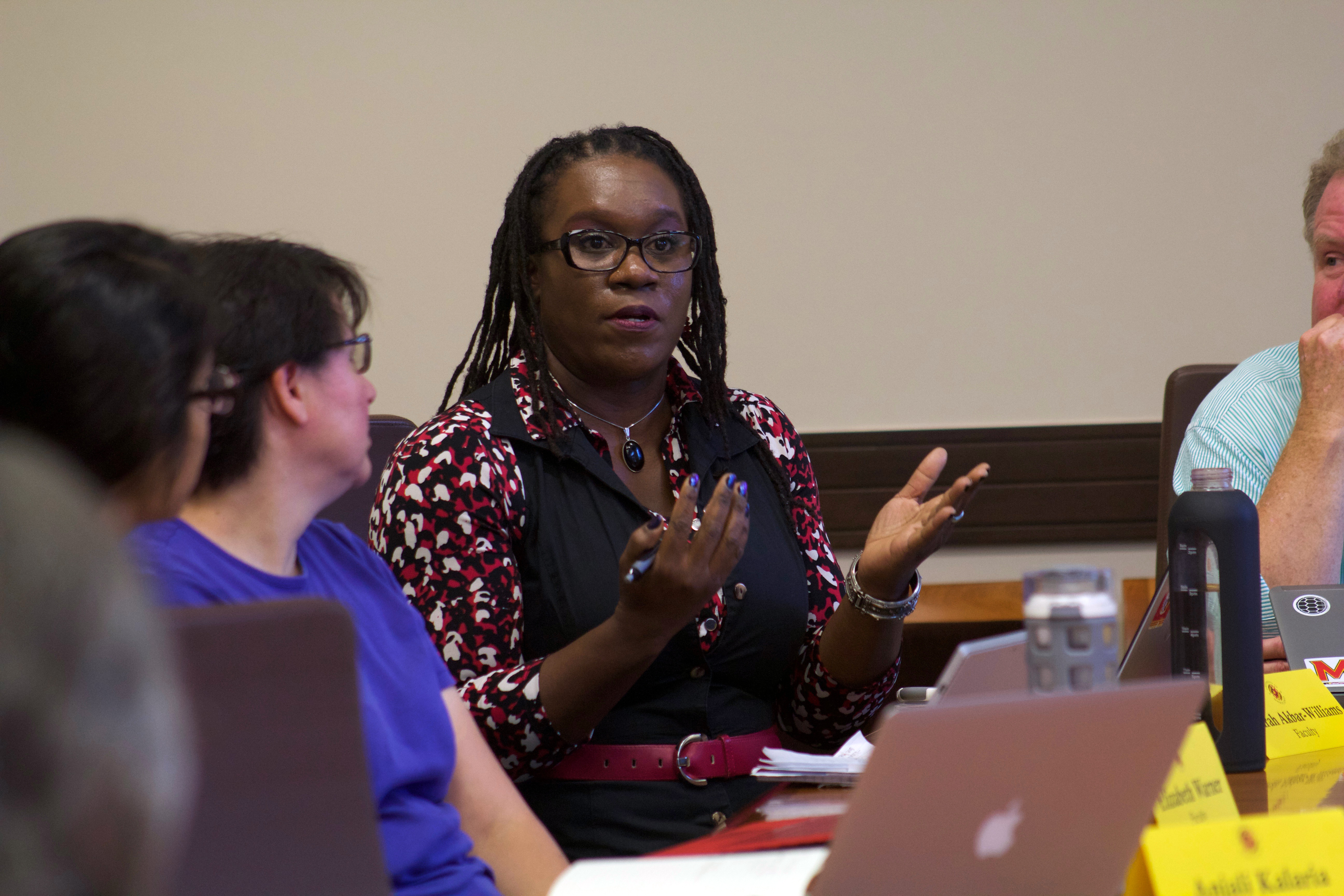The University of Maryland Senate’s Academic Procedures and Standards Committee met Tuesday to discuss potential changes to criminal background checks on undergraduate applications.
Similarly to job applications, many college applications ask students to check a box to say whether they have a criminal or disciplinary background. The committee debated the wording of specific questions on this university’s application, whether questions should be added or taken away, or if the section should exist at all.
When applying to this university, prospective students are asked whether disciplinary action has been initiated or taken against an applicant at any institution they’ve attended. It also asks whether they have been charged with, pleaded guilty to or been found guilty of any criminal offense, aside from a minor traffic violation; where charges have not been expunged; and whether an applicant has pending criminal charges.
This university’s application also asks about any formal disciplinary action or dishonorable discharge from the military. Underneath the questions, applicants can choose to further explain their answers.
[Read more: UMD Senate will review limited enrollment programs for the first time since their creation]
If an applicant does check any of these boxes, Britt Reynolds, director of strategic planning and communications, enrollment management, said the Office of Student Conduct then assesses and investigates the case. They give a recommendation to the admissions office, who has the final say on whether the student is fit for this university and whether they are a safety threat to the campus.
Maria Layana Varas, a criminology and criminal justice graduate student, said having the box puts minorities at a disadvantage.
“The funnel of when people enter the system and how they go through the very end impacts [you] differently depending on your race [and] your socioeconomic status,” she said. “Some people that perhaps didn’t get all the way down to a conviction, even though they committed the same crime, are very different just based on their race and the amount of resources they can have.”
One of the biggest challenges the committee faced is a lack of research and statistically significant data on the issue. Admissions office staff were unable to give a clear estimate of how many more minorities check the box, compared to white applicants, or how many applicants who check the box are then admitted or rejected to this university, due to the small pool of applicants it applies to, Reynolds said.
“When I say minuscule, I really mean minuscule,” said Reynolds during the meeting, adding that the policy only affected a couple applicants last year. “I think in both cases, they had been admitted and the concern happened post-admission, and the admission was pulled.”
Another topic of discussion was whether a question should be added asking potential students if they have ever been part of a hate group, in light of the murder of 2nd Lt. Richard Collins on this campus in May. Sean Urbanski, a former University of Maryland student, has been indicted on murder charges in the killing and was a member of a racist Facebook group called “Alt Reich: Nation.”
[Read more: Campus guns, marijuana bills fail to pass before Maryland General Assembly session ends]
“I think that’s something that should be asked,” said Tahirah Akbar-Williams, an African-American studies and education librarian at this university.
Deputy General Counsel and Chief of Staff Diane Krejsa said applicants with disciplinary action on their records should still apply to this university.
“People should … apply, even with some sort of disciplinary history, or even a criminal conviction — which is pretty rare,” Krejsa said. “That’s the whole idea of ‘ban the box’; we’re saying, ‘We’re not holding this against you,’ we’re giving people second chances if they meet safety standards and show that they’ve matured and grown.”
More than 150 cities and counties nationwide have adopted the “ban the box” movement, leaving employers to consider candidates without knowing about an applicant’s criminal record, according to the National Employment Law Project. Maryland passed “ban the box” legislation for state government employees in 2013. But Gov. Larry Hogan vetoed in May a bill to “ban the box” on college applications, despite passing both chambers of the state legislature.
In the formal letter vetoing the bill, Hogan argued that colleges need to know the full extent of who they are admitting.
“While individuals of all criminal backgrounds should be given educational, employment and growth opportunities, colleges and universities must have the ability to know who they are accepting onto their campuses,” he said in the veto letter. “We should not encourage schools to turn a blind eye to a prospective student’s potentially violent criminal background.”
The committee has until Feb. 9 to deliver a decision or recommendation to the Senate Executive Committee, which will then decide whether it is ready to be sent to the full University Senate in March for a vote. If approved, the proposal will be sent to university President Wallace Loh.
“Right now we’re still really trying to gather information … from many different sources,” committee chair Philip Evers said. “We’re not proposing anything right now; it just remains to be seen at this point.”
CORRECTION: Due to a reporting error, a previous version of the story referred to Britt Reynolds as the admissions director. Reynolds is the director of strategic planning and communications, enrollment management. This story has been updated.



